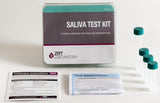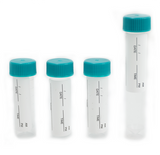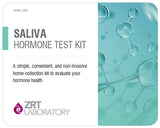DHEA & Testosterone Saliva Test Kit
The DHEA and Testosterone Saliva Test Kit accurately measures two key hormones — DHEAS (Dehydroepiandrosterone Sulfate) and Testosterone (T) — in both men and women. These hormones are essential for energy, strength, libido, and overall well-being.
A simple saliva sample gives you a detailed look at your hormonal balance, helping identify deficiencies or excesses that can affect mood, vitality, and physical performance.
What This Test Measures
- DHEAS (DHEA Sulfate): A vital adrenal hormone that acts as a precursor to both estrogen and testosterone. It supports mood, energy, and stress resilience.
- Testosterone (T): A key sex hormone important for muscle tone, libido, cognitive clarity, bone density, and motivation. Present in both men and women.
- How and when to Collect your saliva samples: Saliva Testing Instructions
- Click to see >> Sample Saliva Test Result Report
Key Features
- Non-invasive saliva collection: No blood draws, collect at home with ease.
- Fast results: Receive your report within 3–5 working days after the lab receives your sample.
- Expert analysis: Includes comments and insights from a PhD Hormone Specialist.
- Comprehensive results: Graphical and numerical data clearly show your hormone levels.
- All-inclusive pricing: Laboratory fees are included; no hidden costs.
- Valid for 12 months: Use anytime within one year of purchase.
- Suitable for all ages: Ideal for both men and women, including teenagers and adults.
- Convenient shipping: You ship your sample following detailed, easy-to-follow instructions.
Who Should Take This Test
If you experience any of the following symptoms, you may benefit from testing DHEA and Testosterone levels:
For Women
- Low energy or fatigue
- Decreased libido or sexual satisfaction
- Muscle weakness or joint aches
- Mood swings, anxiety, or depression
- Bone loss or early menopause symptoms
- Weight gain or body composition changes
- Hair thinning or dry skin
For Men
- Fatigue or loss of stamina
- Decreased libido or erectile difficulties
- Loss of muscle mass or strength
- Increased abdominal fat
- Mood changes or irritability
- Brain fog or memory issues
- Hot flashes or night sweats
Benefits of the DHEA & Testosterone Saliva Test
- Accurate and reliable: Saliva reflects the bioavailable (active) hormone levels in your body.
- Simple at-home collection: No clinic visit required.
- Early detection: Identify low or high hormone levels before symptoms worsen.
- Actionable insights: Results include expert comments and recommendations.
- Supports ongoing monitoring: Track your hormone balance over time.
- Guides treatment: Useful for evaluating hormone therapy or lifestyle interventions.
- Confidential and private: Collect samples discreetly at home.
How It Works
- Order your kit securely online.
- Collect saliva samples at home following easy step-by-step instructions.
- Ship your samples to our certified lab.
- Receive your detailed results in 3–5 working days, including professional analysis and next-step advice.
FAQ
What hormones are tested?
DHEAS and Testosterone — two essential hormones linked to energy, libido, and stress resilience.
Why saliva testing?
It measures the free (active) hormones that directly affect your body, offering more useful data than total blood hormone tests.
Who can use this test?
Men, women, and adolescents who want to check or monitor hormonal health.
Is it accurate?
Yes. Samples are analyzed using advanced laboratory techniques for precise and repeatable results.
Do I need to fast?
No fasting required. Just follow the saliva collection instructions provided.
When will I get results?
Within 3–5 business days after your sample reaches the lab.
Do I get expert interpretation?
Yes. Your report includes analysis and insights from a PhD Hormone Specialist.
How long is the kit valid?
You can use it within 12 months from the date of purchase.
Who pays for shipping?
You’re responsible for shipping the samples to the lab; instructions are included.
Take charge of your vitality today.
Order the DHEA & Testosterone Saliva Test Kit to understand your hormone balance, enhance your energy, and support lasting physical and emotional wellness.
How to use:







